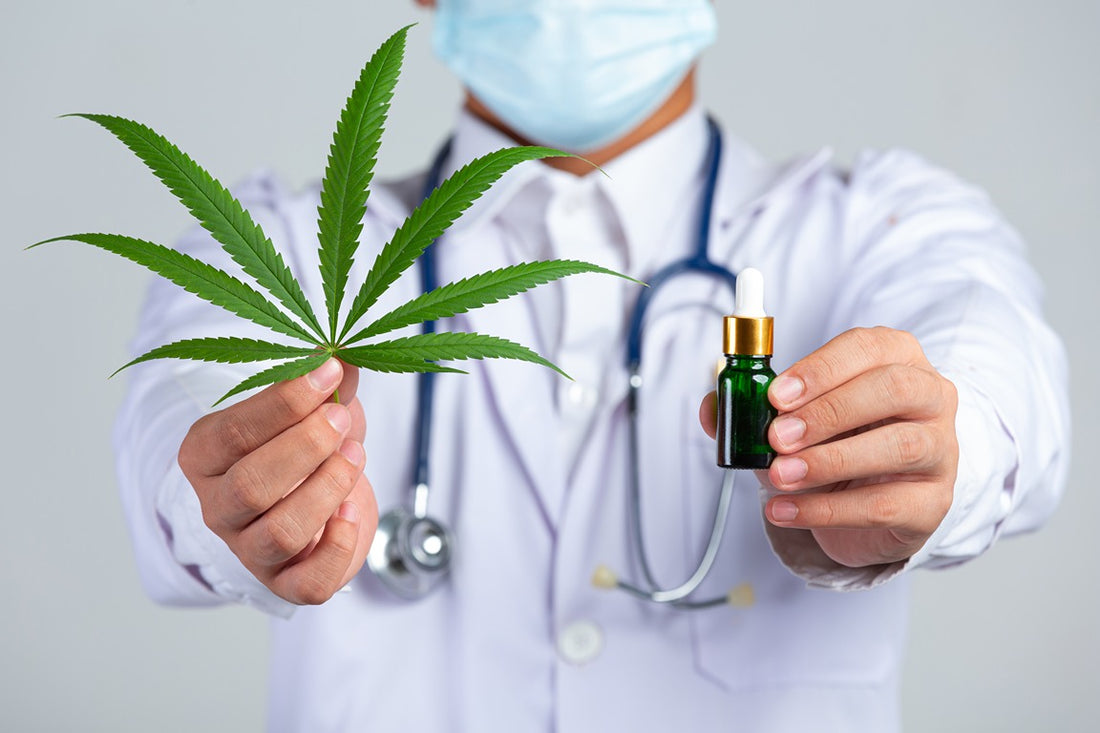
Cannabis And Diabetes
Share
Cannabis and diabetes are two topics that are gaining attention in recent years. This article explores the relationship between cannabinoids and diabetes and how it can potentially help those with the condition. Cannabis has become more popular as a natural supplement. Cannabinoids are the chemical compounds found in cannabis that provide the benefits
Covering the benefits of cannabis on insulin, the ability of cannabis to lower blood sugar levels, its use as a treatment for inflammation, its role in treating obesity, and its potential as a treatment for peripheral neuropathy. This comprehensive guide will provide an overview of the latest research on the topic and offer insights into how cannabis can help those with diabetes.
People have been using cannabis to manage diabetes for years, but only recently has there been enough data collection to prove whether or not it works. There have been several studies done showing both increases and decreases in blood sugar levels depending on the type of cannabis used and how it is consumed.
There are over 100 documented cannabinoids in cannabis, and the one primarily used in supplements is cannabidiol, or CBD. As CBD becomes more popular, it is becoming easier to find in reputable places. Whether you're a patient, a caregiver, or simply interested in learning more about this growing field, this article has the information you need to stay informed.
Studies have shown that certain components in the cannabis plant, such as THCv and CBD, can help regulate insulin levels, lower blood sugar, and even treat symptoms related to diabetes such as inflammation, obesity, and peripheral neuropathy.
This article will discuss how cannabis can affect people with diabetes, how to use it to your advantage, and what doctors think about it.
How can cannabis help people with diabetes?

Diabetes is a widespread and challenging health issue that affects millions of people globally. According to the latest statistics from the Centers for Disease Control and Prevention (CDC), over 100 million adults in the United States are living with diabetes or prediabetes.
The number of individuals affected by this disease has risen dramatically over the years, with an estimated 8.5% of adults having diabetes in the world, a significant increase from the 4.7% reported in 1980. This chronic disease contributes to premature deaths and has become a major cause of debilitating conditions such as blindness, kidney failure, heart attacks, stroke, and amputations of the lower limbs.
Recent developments in the legalization of cannabis have led to an explosion of cannabis-based products in the market. People can now buy cannabis in many forms, including tea, chocolate, and vaping liquid.
Cannabis has been gaining attention as a potential treatment option for individuals with diabetes. While more research is needed, animal-based and human studies have found several potential health benefits for individuals with diabetes who use cannabis.
These benefits include stabilizing blood sugar levels, suppressing arterial inflammation, preventing nerve inflammation and pain, lowering blood pressure over time, improving circulation, relieving muscle cramps and gastrointestinal pain, and potentially reducing intra-ocular pressure in individuals with glaucoma.
For people with type 1 diabetes, using CBD oil in vaping form has been shown to lower blood glucose levels. For people with type 2 diabetes, CBD oil may help manage the condition by reducing insulin requirements and improving insulin sensitivity.
In a small study of people with type 2 diabetes, participants who took a mild drug called metformin in addition to a cannabinoid drug for two weeks reduced their fasting glucose levels by 27%. Fasting glucose refers to the glucose level in the blood when a person is asleep and not consuming any other substances or foods.
The average blood glucose reduction was approximately 24 mmol/L, which would be considered normal for a person with type 2 diabetes after two weeks of using these drugs together. This is an extremely positive outcome for people suffering from the condition.'
Insulin Benefits

Insulin is a hormone that helps regulate the level of sugar in our blood. When we eat food, our body converts it into sugar, and insulin helps to bring down the sugar level. People with type 2 diabetes have problems regulating the sugar level in their blood and often need to take insulin to control it.
Recently, some exciting research has been done on two compounds found in cannabis, THCV and CBD, and their potential benefits for people with diabetes. A study found that THCV and CBD decreased blood glucose levels and increased insulin production in people with type 2 diabetes, which could be a new way to control blood sugar levels.
A recent study even showed that taking oral cannabis extract improved glycemic control in patients who had not responded well to other treatments, such as insulin therapy. This is promising news for people with diabetes who struggle to regulate their blood sugar levels and can lead to fewer complications from high blood sugar, such as nerve damage and kidney failure.
Additionally, studies have shown that THCV and CBD may improve insulin sensitivity and metabolic function in people with type 2 diabetes. These compounds help the body to use energy more efficiently and make fat cells more sensitive to insulin, leading to better glucose regulation.
The hormone glucagon, in addition to insulin, plays a role in the process of glucose regulation. THCV and CBD have been shown to have an effect on glucose regulation in people with type 2 diabetes.
The potential benefits of THCV and CBD in improving glucose regulation and metabolism in people with type 2 diabetes are exciting, and companies like GW Pharmaceuticals are even developing cannabis sprays with these compounds to help with blood sugar regulation. It is always important to talk to your doctor before making any changes to your treatment plan, but the research so far is promising for the future of insulin treatment in type 2 diabetes.
Lower Blood Sugar Levels

Cannabis can help regulate the sugar level in your blood, which is important for people with diabetes. There are two special chemicals in cannabis called THCv and CBD that can help with this. There is also a special substance in cannabis called beta-caryophyllene that can help your body use sugar better.
Studies have shown that THCv can lower the sugar level in your blood, and CBD can help your body produce insulin. This is important because people with diabetes have trouble controlling the sugar level in their blood. They often need to take insulin to help them. But if they take cannabis instead, it can help regulate the sugar level and lower the chance of getting diabetes.
A 2013 analysis showed that people who use cannabis have a 16% lower level of fasting insulin and a 17% lower insulin resistance, leading to a lower incidence of type 2 diabetes. Two cannabinoids in cannabis, THCv and CBD, have been identified as particularly helpful for diabetes.
THCv was found to decrease fasting blood glucose levels while CBD decreased resistin and increased insulin secretion. A study in 2006 showed that CBD also significantly reduced the incidence of diabetes in mice.
It is important to remember that everyone is different and taking cannabis may have different effects on each person. It's important to talk to your doctor before trying anything new.
Treatment for Inflammation

Photo by RODNAE Productions on Pexels
A recent study conducted in 2020 aimed to explore the connection between inflammation biomarkers and self-reported cannabis use among adults. The results showed that patients who reported using marijuana in the past 30 days had lower levels of inflammation biomarkers such as high-sensitivity C-reactive Protein (hsCRP), Interleukin 6 (IL-6), and fibrinogen. Although the findings were not statistically significant, the study suggests that patients who use cannabis for inflammation are experiencing real biological benefits.
The anti-inflammatory properties of cannabis are attributed to the presence of THC, CBD, and other cannabinoids found in the plant, which work together to reduce inflammation in the body. Terpenes, or flavor profiles, also play a role in enhancing the medicinal properties of cannabis, which is why some strains are better at targeting inflammation than others. This phenomenon is referred to as the entourage effect.
CBD, a component of cannabis, has shown promise as a treatment for inflammation in individuals with diabetes. Studies have demonstrated that CBD can reduce inflammation in animal models of diabetes, leading researchers to believe that it could be a promising candidate for anti-inflammatory and neuroprotective therapies. The anti-inflammatory properties of CBD have also been noted as a potential treatment for other illnesses such as cardiovascular disease and atherosclerosis.
Further research is needed to determine the efficacy of using cannabis for treating inflammation, but the promising results of this study make it clear that the topic deserves further attention.
Helps reduce ocular pressure

In addition to its potential anti-inflammatory effects, cannabis has also been found to help people with diabetes manage their condition. This includes reducing ocular pressure, which is a result of high glucose levels in the body.
Another medical application for cannabis is to help people with diabetes manage their disease. Specifically, cannabis can help patients with diabetes manage their glucose levels by helping to reduce ocular glucose pressure in the body.
There are two main types of diabetes: type 1 and type 2. People with type 1 diabetes cannot regulate glucose levels, whereas people with type 2 diabetes can partially regulate them. Unregulated glucose levels can lead to various complications, including vision loss.
Cannabis has been reported to increase appetite in people with type 2 diabetes. As a result, some people use it to prevent overeating and weight gain, which is a common side effect of this type of diabetes.
Treatment for Peripheral Neuropathy

Another potential benefit of cannabis is its ability to alleviate nerve pain, which is a common symptom of diabetic neuropathy.
Diabetic neuropathy is a complication of diabetes that affects the nerves in the body, causing pain and loss of sensation in the hands and feet. This can range from mild tingling to severe pain. While traditional treatments such as prescription drugs and yoga can be effective, adding cannabis to these treatments can also provide relief.
Cannabis has been found to be an effective alternative or adjunctive treatment for peripheral neuropathy, a condition that can cause significant discomfort and is often difficult to treat with traditional methods. Most studies have shown that inhaled cannabis can moderately improve pain associated with peripheral neuropathy, however, there are some negative side effects to consider, such as impaired cognitive function and respiratory problems.
These effects can be especially prominent at high doses. Currently, there is limited data available on the long-term safety of cannabis treatments, which means that physicians should proceed with caution when considering cannabis therapy for peripheral neuropathy.
Clinical studies have shown that cannabis can provide benefits for peripheral neuropathy patients, including reduced pain, improved sleep, and enhanced functionality, even for those who have not seen results from standard treatments. Despite these benefits, doctors should carefully weigh the risks and benefits before recommending cannabis therapy for peripheral neuropathy.
Treatment for Obesity

Photo by Andres Ayrton on Pexels
Cannabis sativa and its derivatives have been gaining attention as a possible treatment for obesity and its comorbidities. Obesity is defined as an excessive accumulation of fat in the body that can be harmful to health. This excess fat triggers an inflammatory process in the adipose tissue, making obesity a low-grade chronic inflammatory disease.
Given the complex and multifactorial nature of obesity, researchers are exploring new therapeutic alternatives, including herbal medicines. In this context, the pharmacological properties of the predominant isolated components of Cannabis sativa, Δ9-tetrahydrocannabivarin (THCV), Δ9-tetrahydrocannabidinol (THC), and cannabidiol (CBD), are being studied for their potential in treating obesity.
There is existing scientific evidence on the clinical application of Cannabis sativa as a treatment for obesity. Data collection was performed using the PubMed electronic database and the following word combinations: "Cannabis and obesity," "Cannabis sativa and obesity," "THCV and obesity," "THC and obesity," "CBD and obesity," and "Cannabis sativa and inflammation.
The results of this review suggest that phyto-cannabinoids derived from cannabis sativa have therapeutic potential in the treatment of obesity due to their anti-inflammatory, antioxidant, and neuroprotective properties. However, further research is necessary to better understand the risk-benefit profile of cannabis as a treatment for obesity and its associated comorbidities.
In conclusion, while the potential therapeutic properties of Cannabis sativa and its derivatives are promising in the treatment of obesity, it is important to understand that the best way to fight obesity is through a healthy lifestyle that includes regular exercise, a balanced diet low in sugar, and adequate hydration. Eating a diet rich in fruits, vegetables, and getting enough sleep can also help maintain a healthy weight.
While cannabis may have some benefits, it should not be relied upon as a sole solution to the problem of obesity. Instead, a comprehensive approach that involves exercise, nutrition, and hydration is the most effective way to maintain a healthy weight and prevent obesity and its associated comorbidities.
